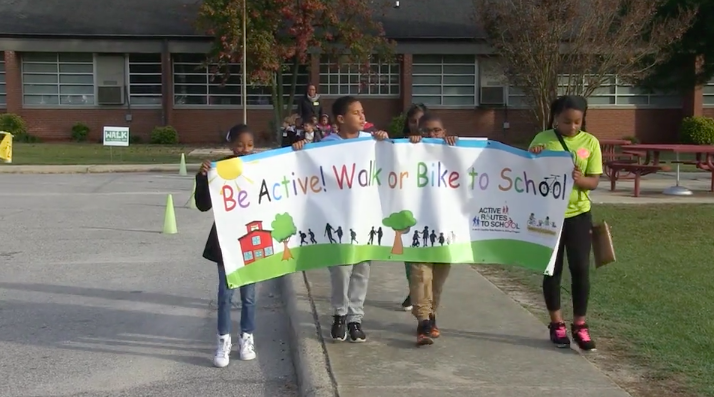Reading, writing and ... getting run over?
A program that helped 66,000 students in almost every county in North Carolina get to school safely is being abruptly ended by the state's Department of Transportation.
The Active Routes to School Program, which is part of a larger $16-million "Safe Routes to School program," is being eliminated next year, the state's Division of Public Health confirmed to Streetsblog. It cost about $6.5 million dollars, all of which came from the federal government, NCDOT reports. The state's contribution was limited to in-kind work, but changes in federal rules now require a 20 percent match: about $1.3 million.
Meanwhile, NCDOT's 10-year spending plan calls for pouring $3 billion into 28 highway projects. But the state hasn't been able to find a 20 percent match for the Active Routes to School program, state officials tell Streetsblog.
The goal of the "Active Routes" program was to lower childhood obesity by increasing walking and biking to school. There's also another bottom line: school districts could save money on buses if they dramatically increase the number of kids walking or biking to class.
The program had multiple strategies: Its "Walk and Bike to School Day" events and its teacher training raised awareness about safe walking and biking. Last year, the program also helped 16 schools in the state to design safer streets with infrastructure such as better sidewalks and crosswalks.
The end of Active Routes comes after state forfeited $4 million in federal Transportation Alternatives Program funds because it simply failed to use them, said Margo Pedroso at the National Safe Routes to School Partnership. The money is supposed to be used for walking and biking programs and projects — but NCDOT wasn't able to allocate the funds before the four-year deadline.
Margo Pedroso from the National Safe Routes to School Partnership says North Carolina law is very specific about how the funding can be spent and that has been an obstacle for the state in spending down the federal funds. An additional $2 million in federal funding will expire in September if the state does not allocate it. But Hanna Cockburn, the DOT's director of the bike and pedestrian division, told Streetsblog she is confident it will get spent before the looming deadline.
Ending the program "would be a real shame," Pedroso said. "They are one of only a handful of states that really makes sure through this model that they get help even to the most rural parts of the state."
Even North Carolina officials admit that street safety education and awareness works. According to an internal evaluation, students in the Tar Heel State who participate in a Walk to School Day event and have an in-school "champion" are nine times more likely to walk to school.
A spokesman for the state DOT said "We are committed to this program and the tenets of this program" but that state law prevents the DOT from providing the required $1.3 million match.
Meanwhile, the state continues to lavish money on highways — including $400 million to widen highways in Asheville, a project that was once named one of the top 11 "highway boondoggles" in the country by the U.S. Public Interest Research Group.
This story was updated at 2:02 p.m. Aug. 24 to add new information from NCDOT.






